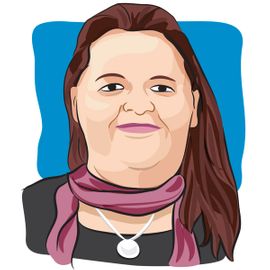- About Us
- Advertise / Support
- Editorial Board
- Contact Us
- CancerNetwork.com
- TargetedOnc.com
- OncLive.com
- OncNursingNews.com
- Terms & Conditions
- Privacy
- Do Not Sell My Information
© 2025 MJH Life Sciences™ and CURE - Oncology & Cancer News for Patients & Caregivers. All rights reserved.
Caregivers, Celebrate Who You Are

Kim was a caregiver for her sister while she battled stage 4 Hodgkin Lymphoma for nearly five years, from diagnosis through an autologous transplant. She turned her experience into change and has since become an activist in finding a cure for cancer. Kim has worked in politics and assisted in the passing of numerous legislative pieces impacting patients with cancer and their families. She is an activist in the field of oncology, nursing and beyond. Additionally, she is a volunteer and champion for a cure with the Leukemia and Lymphoma Society's Light the Night Campaign. Kim has shared her experiences with cancer as a contributor with Cure and through public speaking engagements throughout the United States.
I had my own complete life external to cancer. I also had my life within the constant reality of cancer.
Being a caregiver played a huge role in shaping who I am today. This year, while celebrating National Survivor’s Day, I came to learn that a Caregiver’s Day existed. When I first was told, I had mixed feelings about it. When people became aware that I was my sister’s primary caregiver, I received varying reactions.
I rarely knew what to expect when I told people, but their reactions were both irritating and frustrating to me. People pitied me and the first word was usually, “sorry.” To this day, sorry is one of my most hated words in the English language. “Sorry” did not fix the fact that my sister was ill. It did nothing to change the situation that we found ourselves in. Instead, it seemingly turned the attention back to me and forced me to then fill the silence. It created many uncomfortable situations, which was hard because I was already dealing with so much during that time.
I struggle with the notion of a celebration. For me, there was and is an ever-present layer of guilt to my time as a caregiver. While my sister is now a survivor, she struggled greatly to get to where she is today. Some say that I should be applauded for keeping her alive, but that begs the question, what about all the wonderful caregivers who did all that they could but lost a loved one anyway? Should we not applaud and honor them for all that they did?
Being a caregiver is not easy. Caring for a family member comes with its own set of complications. The hardest for me was always knowing that if she passed away, I would remain here. Although I can rationally say it wouldn’t have been my fault, living with a perceived sense that I had failed haunted me often.
Once I removed my emotions and feelings from the situation, I was able to see the value in a day devoted to those who care. As a caregiver, I can look back and recall so much about the journey of having cancer in my life. When I recall these moments, it usually always is about my sister and her part of journey. It was never so much about me or my journey until I began sharing it here through my work with CURE.
The truth is that while cancer was wreaking havoc on what we thought was normal, a second story was also unfolding: my story, which was that of the caregiver. I had my own complete life external to cancer. I also had my life within the constant reality of cancer. My story includes how I changed from being a scared sister to a nursing student and everything that happened in between.
While caregiving was not the entirety of who I was, I still think we should celebrate. No matter if someone chooses or is given that title, it is one that carries a levity that outsiders simply cannot fathom. For those of us who have done so can surely say that we are now stronger for doing what we did. And it changes you — I know it changed me.
So, despite my initial hesitation, I gathered with friends on Nov. 1 this year to celebrate who I am because of being a caregiver. I encourage all caregivers to mark their calendars to do the same next year.
Related Content:



